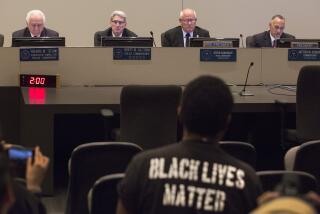After an Intense Four Years, N.Y.’s Police Commissioner Steps Down
- Share via
NEW YORK — Howard Safir, whose leadership of New York’s Police Department was marked by plummeting crime rates but also racial incidents that drew national attention, announced Tuesday he is resigning as commissioner.
“I am leaving probably the best job that any human being could have,” he told a City Hall news conference with, as usual, Mayor Rudolph W. Giuliani at his side. “Crime is the lowest it’s been in three decades.”
The mayor, who will lose one of his closest confidants, praised Safir as the city’s “greatest police commissioner.”
Unlike his predecessor, William J. Bratton, who sought the media spotlight, Safir’s loyalty to the mayor was complete.
The two stood shoulder to shoulder during investigations of the police station house torture of Haitian immigrant Abner Louima, the killing of Amadou Diallo in a barrage of 41 police bullets and the slaying by an undercover detective of Patrick Dorismond. In the shootings, neither victim was armed.
“So many men and women of this Police Department do an outstanding job day in and day out,” Safir said, warning against criticism of the entire 41,000-member force because of “three horrible incidents.”
“I think the perception and the reality are very far apart,” he said.
The 58-year-old Safir, who like Giuliani is being treated for prostate cancer, will join Choice Point, a corporate security company.
Giuliani declined to discuss a successor, concentrating instead on praising Safir for his 25 years in law enforcement.
“I don’t think anyone would dispute the fact that under this commissioner, crime is down more than [under] any other commissioner in the history of the city,” Giuliani said.
“Some people would be surprised to know that restraint on the part of the NYC Police Department has improved more under this police commissioner than at any time in the last 30 to 40 years.”
That view is not universally shared. The decline in crime began under Mayor David N. Dinkins but quickened during the Giuliani administration, reflecting a national trend.
During Safir’s four years at police headquarters, homicides declined from 2,245 in 1990 to 671 last year. Major crimes also dropped, but at a price, critics charged: the civil rights of some residents, particularly in poor neighborhoods.
The U.S. Civil Rights Commission earlier this year in a critical report said it appeared some of the department’s anti-crime units engaged in racial profiling.
In a similar report, New York state Atty. Gen. Eliot L. Spitzer charged that blacks and Latinos are stopped more often and searched by police officers.
At his news conference, Safir defended the department’s record in minority neighborhoods.
The commissioner said when he visits Harlem, the Bedford-Stuyvesant section of Brooklyn and Jamaica in Queens “and I meet with 200 to 300 people of color, they don’t tell me they don’t like the police and the police are abusing them.”
“What they always say to me is that we like our police, we need more police. I am not suggesting there are never times when there are periods of abuse by individual officers. But when you have 41,000 police officers, that’s going to happen.
“When it happens, we take action and we deal with it. But to take three horrible incidents and broad-brush the entire Police Department is the same thing as if somebody of ethnicity robbed a bank and I said everybody of that ethnicity were bank robbers.”
Safir said it was unfair to judge his tenure solely on the brutalization in a Brooklyn station house of Louima in 1997, the 1999 slaying of Diallo and Dorismond’s killing in March.
Police Officer Justin Volpe last year pleaded guilty to attacking Louima. Five other officers also were convicted in that case in a scandal that clearly shook confidence in the department.
In February, a jury acquitted four officers charged with killing Diallo because they mistook the wallet he was holding for a gun. A grand jury declined to indict in the case of Dorismond, who grew enraged when he was asked by a detective whether he had narcotics when he didn’t during a confrontation at a known drug-selling location.
Safir said his health wasn’t a factor in his resignation, and he sought to stress his independence.
“It is probably a good time to set the record straight,” he said. “The mayor does not run the Police Department. I have, and the mayor has been an incredible supporter. One of the reasons some people might have thought that the mayor had great influence on the Police Department is for 25 years, Rudy Giuliani and I have thought almost exactly alike on law enforcement issues, and we’re totally in sync.”
More to Read
Sign up for Essential California
The most important California stories and recommendations in your inbox every morning.
You may occasionally receive promotional content from the Los Angeles Times.













